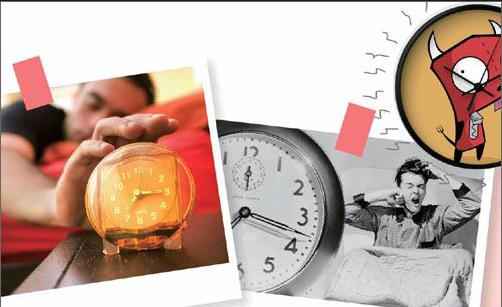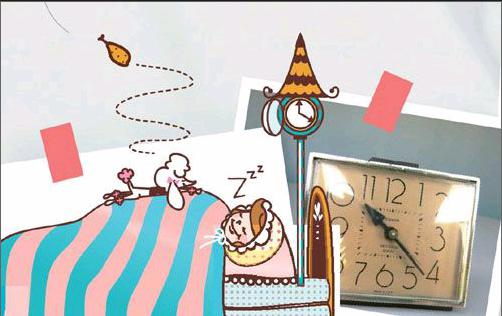The Devil Is in Your Snooze Button 小睡按钮,骗你没商量!
Casey+N.+Cep



I feel like Faustus2) every morning. The warm darkness of sleep around me like a blanket, I listen as Mephistopheles3) whispers: “Oh, Faustus, dear, I am here.” I listen, but want so badly to still be asleep: “What do I care, there is no here.” There is neither here nor there in sleep, no anywhere really.
“Faustus,” Mephistopheles says, this time tugging softly at the blanket of darkness, “dear Faustus, wouldnt you like more rest? I never lie. You can have a few more minutes.” I close my eyes against the day and answer: “Oh, Mephistopheles, Id do anything for more sleep, even a few more minutes.”
The bargain is struck nine minutes at a time. I am Faustus, but the devil is my alarm clock or cell phone, whichever Ive managed to set the night before. The devil offers me little extensions of nine minutes, and I happily accept three or four installments4) every single morning.
Then Mephistopheles enforces the bargain. I stumble out of bed, at least 18, though usually 36 minutes later than when I had planned. I am late, and I will have bargained away5) all the leisure and pleasure of the morning: no time for taking a shower, no time for toasting a bagel or bread, no time for reading the newspaper, no time for brewing coffee at home. I wonder sometimes what my neighbors think of me: all those endless choruses of alarm chimes6) and bells not once a morning, but at least three or four times on repeat.
Snooze is the enemy of both sleep and wakefulness. Snooze is the devil that cheats us into thinking well be more awake for those nine extra minutes of sleep, more rested for every one of those sleep extensions we accept from Mephistopheles. But its all a lie: nine minutes at a time, the snooze cheats us of our waking life. It hasnt always been this way. Alarm clocks are an ancient device, but the snooze button is a recent invention.
There have always been ways of waking: even before clocks, there were crowing roosters and the rising sun. When water clocks first appeared centuries ago in Egypt, they were modified over time to include alarms. Bells and whistles were adjusted to specific levels in the container from which or into which the water fell. These noisemakers sounded whenever the water rose or fell to the appropriate level, providing a reliable alarm for keeping time. Theres some indication that even Plato used such a clock, sounding a water organ early every morning to mark the beginning of his lectures.
The history of horology7) is entangled with the history of commerce, so the next wave of time-keeping developments was tied to industry. Alarms came in the form of town clocks, factory whistles, and neighborhood knocker-uppers. Town clocks chimed the early morning hours; factory whistles sounded the hours of shift work; and knocker-uppers went around cities knocking on windows or doors at arranged times so that everyone could make it to work. None of these methods offered the opportunity for drowsing8). Even when Seth Thomas9) patented a small mechanical alarm clock in 1876, there was still no snooze function.
For centuries we got by without the snooze. It was only in 1956 that General Electric-Telechron released the Snooz-Alarm, which came equipped with a control bar for snoozing. Westclox released their Drowse Alarm three years later, which featured the choice between snoozing for five minutes and 10 minutes. There is so much more truth in advertising with drowse than snooze, since what you get with each interval is less like sleeping and more like drowsing—a pitiful mix of hazy10), haunted wakefulness.
The original Snooz-Alarm had a nine-minute snooze, which became the standard, though there is not much consensus about what dictated that arbitrary interval. There is some speculation that engineers were constrained by mechanical gears and had to choose between complicated double-digit intervals and the easier nine-minute dose. Nine minutes was the most you could get without designing a more sophisticated mechanism. For all the customizable features of modern alarms, from radio stations, specific songs, a multitude of tones, user-recorded messages, its surprising that no one has allowed us the freedom of timing our own snoozing for something less regulated than nine minutes.
A stitch in time may save nine11), but every nine minutes of snooze wastes a little slice of our lives. Since 1956, we have been confusing snooze for sleep, sacrificing our waking life nine minutes at a time. Not only do we delay the start of our days, but we compromise the very sleep we are trying to steal. The healthy, continuous sleep cycles we need are thoroughly disrupted by the snooze. When we hear the first sound of the alarm, our bodies release adrenaline12) and cortisol13), hormones that wake us, interrupting our natural sleep cycle to make us alert.
Surrendering to the temptation of the snooze erases that hormonal surge: our bodies try to reenter the deeper periods of sleep. Only those restorative levels of sleep take a lot longer than nine minutes to enter, so every snooze confuses our bodies even more. We think three or four snoozes are the equivalent of an extra 30 or 40 minutes of rest, but the patchy14), interrupted sleep of snooze is worse than no sleep at all. Instead of the natural sleeping then waking, the snooze drags us into unhealthy, unsatisfying fits of trying to sleep and trying to rise, but failing to do either.
I lived without the snooze for the first two decades of my life. It was only during a particularly sleep-deprived period of college that I gave in to the temptation of tapping that button three or four times every morning. Like any addiction, its hard to break. I go to bed contracting with my future self to rise the precise moment the alarm sounds, but morning after morning my future self cheats my past self with one snooze after another. Day by day, I rise groggier15) and drowsier, taking hours instead of minutes to actually, truly awaken.
So how are we to resist the wiles of Mephistopheles? If the war on smoking was won partly by convincing smokers that every cigarette stole 11 minutes of their lives, then perhaps the war on snooze can be won by convincing sleepers they lose nine, 18, 27, even 36 minutes of their sleep lives every morning. We must realize that every snooze is not nine minutes gained, but hours lost: not only of productive sleep, but productive wakefulness.
Next time Mephistopheles whispers in your groggy ear, try rejecting his bargain. Dont cheat yourself out of restful sleep or waking life. Sleep scientists suggest going to bed earlier or setting your alarm for later, but never giving in to the cheat of the snooze. Rather than negotiating that Faustian bargain every morning with the snooze, try setting a second alarm for 30 or 40 minutes after the first. If you find yourself too sleepy to rise when you first intended, let yourself get real, restful sleep before trying again. Its a war on snooze, but one we can win one morning at a time.
每天早晨,我都感觉自己像浮士德。温暖、昏沉的睡意像毯子一样包裹着我,我听到靡菲斯特在轻声低语:“哦,浮士德,亲爱的,我在这儿。”我听着,却死活都不愿醒来:“我才不在乎呢,哪有什么‘这儿。”睡梦中没有这儿,也没有那儿,其实哪儿都没有。
“浮士德,”靡菲斯特这次一边轻轻拉扯包裹着我的沉沉睡意,一边说,“亲爱的浮士德,你不想多休息一会儿吗?我从不说谎。你可以再多睡几分钟。”我闭上眼睛,不去理会天光已亮,回答道:“哦,靡菲斯特,只要能多睡一会儿,我什么都愿意做,哪怕多睡几分钟也行。”
我们达成了交易,每次九分钟。浮士德就是我,而魔鬼则是我在前一天晚上设定好的闹钟或手机。魔鬼准许我每次多睡短短的九分钟,我则每个早上欣欣然地接受三到四次这样的宽限。
之后,靡菲斯特履行了交易。我东倒西歪地从床上爬起来,比原计划的起床时间晚了至少18分钟,不过通常是晚了36分钟。我不仅起晚了,还会在这样的交易中失去早间全部的闲适和乐趣:没时间淋浴,没时间烤贝果或面包,没时间读报,没时间在家煮咖啡。有时我会好奇邻居们怎么看我:所有那些无休无止的闹铃声同时响起,每天早上不是响一次,而是会重复至少三四次。
小睡对于睡眠和清醒都有害处。它是欺骗我们的魔鬼,让我们以为多睡九分钟会使我们更加清醒,以为每从靡菲斯特那里多获得一次睡眠宽限我们就能休息得更好。但一切都是谎言:小睡骗走了我们清醒的时光,每次骗走九分钟。这样的状况并非一直存在。闹钟虽然古已有之,但小睡按钮却是近来的发明。
一直以来就有许多让人们醒来的方法:甚至在钟表出现之前,高唱的雄鸡和初升的红日都可以将人们唤醒。许多世纪以前,水钟最早在埃及出现,后来人们逐渐对其加以改进,增加了闹铃。人们在水流出或流入的容器的特定位置调整好铃铛和哨笛,当水面上升或下降到相应的高度时,这些发声装置就会发出响声,为人们计时提供可靠的闹铃。有迹象表明,连柏拉图都曾经使用过这种水钟。每天清晨,水风琴会被奏响,这就标志着他该开始授课了。
测量时间的历史与商业的历史密不可分,因此计时方式的下一轮发展与工业紧密相连。城镇钟楼的大钟、工厂的汽笛和街区里叫早的人都起到了闹钟的作用。城镇钟楼的大钟在清晨报时,工厂的汽笛在换班时间吹响,而叫早的人则走遍城市的大街小巷,在约定的时间敲响住户的门窗,以保证人人都能按时上工。上述这些方法都没给人们提供打盹的机会。即使到了1876年,当塞思·托马斯公司为一款小型机械闹钟申请专利时,闹钟的小睡功能仍然没有出现。
许多世纪以来,人们无须小睡也可以过活。直到1956年,通用电气旗下的Telechron公司才推出了“小睡闹钟”,这种闹钟带有一个小睡功能的控制杆。Westclox公司在三年后推出了他们的“瞌睡闹钟”,其主要特色是提供了小睡五分钟和十分钟这两种选择。用“瞌睡”这个词来做宣传比用“小睡”要贴切得多,因为每一段间隔给你带来的更像是瞌睡,而不像是睡眠—— 是一种可怜的混杂了意识模糊和焦虑不安的清醒状态。
最早的“小睡闹钟”能让人小睡九分钟,这成了一个标准,尽管人们对这个随意的间隔时间从何而来众说纷纭。有一种猜测是,工程师们受到机械齿轮的制约,不得不在复杂的两位数时间间隔和较为简单的九分钟间隔之间做出选择。在无须设计更为复杂的机械装置的前提下,九分钟是人们所能得到的最长时间间隔。现代的闹钟虽然有无线电台、自选歌曲、多种铃声和用户录制的留言等各种可定制的特征,但不可思议的是,竟然没有一款闹钟在那刻板的九分钟之外允许我们有自行决定小睡时间的自由。
“补救及时,以一当十”也许言之有理,但每一段九分钟的小睡都浪费了我们生命中的一小段光阴。自1956年以来,我们一直把小睡和睡眠混为一谈,每次牺牲自己九分钟的清醒时光。我们不仅推迟了一天开始的时间,也正损害了我们试图窃取的睡眠。我们所需的健康、连贯的睡眠周期完全被小睡打乱了。当听到第一声闹铃时,我们体内会分泌肾上腺素和皮质醇,这两种激素会唤醒我们,中断我们自然的睡眠周期,以此让我们警觉。
屈服于小睡的诱惑会消除那种激素的激增:我们的身体设法再度进入深度睡眠。可是我们需要比九分钟长得多的时间才能进入那种恢复性睡眠的阶段,因此每小睡一次,我们的身体就变得越加错乱。我们以为小睡三四次就等于多休息了三四十分钟,但这种零碎、间断的小睡还不如干脆不睡。小睡带来的不是从睡到醒的自然切换,而是使我们陷入了努力入睡、努力醒来却都徒劳无功的一阵阵挣扎之中,既不利于健康,也无法让人满足。
在人生的前20年里,我并没有小睡的习惯。直到在大学期间一段睡眠尤其不足的时期,我才禁不住诱惑,每天早晨按下那个按钮三四次。像任何一种成瘾的行为一样,这个习惯很难改掉。上床睡觉时,我会和未来的自己约好,要在闹铃响起的那一刻准点起床,可是日复一日,未来的我却用一次又一次的小睡欺骗过去的我。时间一天天过去,我起床时越来越感到昏沉和困倦,需要花费几个小时而不是几分钟才能真正完全清醒。
那么我们该如何抵御靡菲斯特的花言巧语呢?如果反对吸烟的斗争得以取胜的部分原因是让吸烟者相信每支香烟会夺走他们11分钟的寿命,那么如果让爱睡觉的人相信每天早上他们都损失了9、18、27甚至36分钟的睡眠时间,针对小睡的斗争或许也能取得胜利。我们必须意识到,每一次小睡不是赢得了九分钟,而是失去了几个小时:既失去了踏实的睡眠,也失去了富有成效的清醒时间。
下次,当靡菲斯特在你昏昏沉沉的耳边轻声细语时,试着拒绝和他做交易。不要被骗去了自己酣畅的睡眠和清醒的时光。研究睡眠的科学家建议要么早点上床睡觉,要么把闹钟定得晚一点,但是千万不要屈服于小睡的诱惑。与其每天早上与小睡进行浮士德式的交易谈判,不如试着将第二个闹钟定在第一个闹钟的30~40分钟之后。如果你第一次打算起床时觉得太困起不来,那就让自己真正安稳地先睡一会儿再尝试。这是向小睡发起的斗争,不过我们每次只能取得一个早上的胜利。
1. snooze button:(闹钟的)小睡按钮,止闹
按钮
2. Faustus:浮士德,德国中世纪传说中的术
士,为获得青春、知识和魔力,将灵魂出卖
给了魔鬼。
3. Mephistopheles:靡菲斯特,中世纪神话中的魔
鬼,浮士德把自己的灵魂卖给了他。
4. installment [?n?st??lm?nt] n. (故事、计划等的)部分
5. bargain away:为了换取没有价值或者价值很低的物品而失去或者放弃(自由、幸福等)
6. chime [t?a?m] n. 钟声;类似钟声的声音
7. horology [h??r?l?d?i] n. 测时法;钟表学
8. drowse [dra?z] vi. 打瞌睡,打盹
9. Seth Thomas:指塞思·托马斯钟表公司(Seth Thomas Clock Company),创始人为美国钟表匠塞思·托马斯(1785~1859)。
10. hazy [?he?zi] adj. 朦胧的,模糊的
11. A stitch in time may save nine:此处化用了谚语“A stitch in time saves nine”,形容及时的补救措施可以使人省下日后的更多麻烦。
12. adrenaline [??dren?l?n] n. [生化]肾上腺素
13. cortisol [?k??t??s?l] n. [生化]皮质醇
14. patchy [?p?t?i] adj. 不完全的;散落的
15. groggy [?ɡr?ɡi] adj. 昏昏沉沉的

